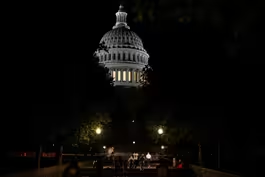
What consumers can expect as de minimis exemption ends
Clip: 8/29/2025 | 5m 50sVideo has Closed Captions
What consumers can expect as de minimis exemption ends
Americans are no longer able to import cheap foreign goods tariff-free. The Trump administration ended the de minimis exemption, which allowed packages valued under $800 to enter the U.S. with no import tax. Last year, there were nearly four million such packages a day. Amna Nawaz discussed the latest with Clark Packard. He is a trade expert at the libertarian Cato Institute.
Problems playing video? | Closed Captioning Feedback
Problems playing video? | Closed Captioning Feedback
Major corporate funding for the PBS News Hour is provided by BDO, BNSF, Consumer Cellular, American Cruise Lines, and Raymond James. Funding for the PBS NewsHour Weekend is provided by...

What consumers can expect as de minimis exemption ends
Clip: 8/29/2025 | 5m 50sVideo has Closed Captions
Americans are no longer able to import cheap foreign goods tariff-free. The Trump administration ended the de minimis exemption, which allowed packages valued under $800 to enter the U.S. with no import tax. Last year, there were nearly four million such packages a day. Amna Nawaz discussed the latest with Clark Packard. He is a trade expert at the libertarian Cato Institute.
Problems playing video? | Closed Captioning Feedback
How to Watch PBS News Hour
PBS News Hour is available to stream on pbs.org and the free PBS App, available on iPhone, Apple TV, Android TV, Android smartphones, Amazon Fire TV, Amazon Fire Tablet, Roku, Samsung Smart TV, and Vizio.
Providing Support for PBS.org
Learn Moreabout PBS online sponsorshipAMNA NAWAZ: A federal appeals court today ruled that President Trump has no legal right to impose sweeping tariffs on nearly every country in the world.
But the court is allowing the tariffs to remain in place until at least mid-October, giving the Trump administration time to appeal to the U.S. Supreme Court.
That comes as another piece of the president's tariffs plan goes into effect.
Starting today Americans are no longer able to import cheap foreign goods tariff-free, at least for now.
The Trump administration ended the so-called de minimis exemption, which allowed packages valued at less than $800 to enter the U.S. with no import tax.
Last year, there were nearly four million such packages a day, over 1.3 billion overall.
The end of that exemption for goods from China went into effect this spring.
Today, it was extended to the rest of the world.
For more on this, I spoke just before the court decision with Clark Packard.
He's a trade expert at the libertarian Cato Institute.
Clark, welcome to the show.
Thanks for joining us.
CLARK PACKARD, Cato Institute: Thanks for having me on.
AMNA NAWAZ: So most people may not have even known that they were benefiting from this de minimis exemption, but now that it's gone, what is the impact?
What kinds of goods are impacted and what type of shoppers?
CLARK PACKARD: Yes, that's a good question.
Goods that arrive in the United States under the de minimis exemption tend to be clothing, footwear, small electronics.
So think about a phone charger, for example, as well as durable goods.
So a phone case might arrive in the U.S. or something like leather.
Again, but it tends to be more on the footwear and apparel side.
AMNA NAWAZ: And so what does that mean for the shopping experience?
What changes?
Everything is now subject to tariffs.
So it costs more.
Is there additional paperwork for customs?
What happens?
CLARK PACKARD: Both of those certainly.
Yes, the products that now arrive that would have been duty-free are now subject to the tariffs that have increased under the Trump administration.
So prices will increase for those products.
But also, like you mentioned, there's going to be a delay in receiving the items in the first place.
One of the things that the de minimis exemption did was help facilitate a pretty seamless transition or arrival of packages.
And now that that is eliminated, it will subject those packages to a slower process.
So consumers should expect a delay in receiving small-dollar items.
AMNA NAWAZ: And does this just apply to commercial items?
I mean, if I have family in other countries who want to send me a gift or a care package, is that subject to this as well?
CLARK PACKARD: No.
So, gifts, personal gifts can arrive in the United States valued at up to $100 and not be subjected to a more rigorous customs process or duty process.
So, in that respect, cookies from grandma from Canada will continue to enter the U.S. duty-free.
AMNA NAWAZ: So we should point out bigger picture here that direct-to-consumer e-commerce has absolutely exploded in the last 10 years.
Those 1.3 billion shipments that I mentioned last year, that is up from just 134 million back in 2015.
So how do sellers, how do producers, how do they respond to this?
Is everyone just going to raise prices, or could you see them actually moving production to the U.S.?
CLARK PACKARD: I think that eliminating the de minimis exemption on its own will not do much to reshore production of various products, and if it did it would certainly raise the cost of those products.
But when you add the de minimis exemption elimination to the broader trade agenda of the Trump administration, including aggressive tariffs on all kinds of products, maybe it does a little bit to induce more manufacturing in the United States.
I think it's a little early to tell.
But ultimately those costs will be borne by way of higher prices for American consumers.
AMNA NAWAZ: That boost to domestic manufacturing, that is part of the justification that President Trump, the administration have put forward for this.
They have also said that the exemption allowed fentanyl to be smuggled into the U.S. and that's part of their reason for this.
What do we know about that?
Is there truth to that?
CLARK PACKARD: I do think there's some kernel of truth to that.
At the same time, though, I would caution that the Trump administration is basically using every tool available to it in a protectionist manner.
So if this were some other administration that didn't have quite as much of a protectionist bent, I would take the fentanyl argument more seriously.
That said, again, I do think there is some validity to what the Trump administration is arguing.
However, I would have preferred to see the administration use extra money to beef up the screening process to maybe interdict more drugs that are entering the United States under the exemption, rather than just completely eliminating the exemption, which will impact all kinds of Americans.
And the overwhelming majority of packages that arrive in the United States under the exemption do not have any sort of drug or illegal substance in them.
And so I think ultimately people's lives are going to be impacted in a way that's probably pretty negative for them.
But, again, I do think that there was a little bit of validity to what the Trump administration is arguing.
AMNA NAWAZ: All right, Clark Packard of the Libertarian Cato Institute joining us tonight.
Clark, thank you.
Good to speak with you.
CLARK PACKARD: Thanks for having me.
20 years later, a look at the legacy of Hurricane Katrina
Video has Closed Captions
Clip: 8/29/2025 | 5m 28s | 20 years later, a look at the legacy of Hurricane Katrina (5m 28s)
Brooks and Atkins Stohr on school shooting response
Video has Closed Captions
Clip: 8/29/2025 | 10m 13s | Brooks and Atkins Stohr on the political response to the Minnesota school shooting (10m 13s)
Cindy McCain describes dire conditions after visit to Gaza
Video has Closed Captions
Clip: 8/29/2025 | 6m 32s | WFP's Cindy McCain describes dire conditions after visit to famine-gripped Gaza (6m 32s)
Democrat warns Trump firing challenges integrity of STB
Video has Closed Captions
Clip: 8/29/2025 | 4m 58s | Democrat warns Trump firing challenges integrity of STB ahead of railway merger decision (4m 58s)
Israeli frustrations rise as war and hostages remain in Gaza
Video has Closed Captions
Clip: 8/29/2025 | 7m 54s | Frustrations rise in Israel as war endures and hostages remain in Gaza (7m 54s)
Katrina victims reflect on how the storm changed their lives
Video has Closed Captions
Clip: 8/29/2025 | 4m 42s | Katrina victims reflect on how the storm changed their lives (4m 42s)
News Wrap: Trump trying to block $5B approved by Congress
Video has Closed Captions
Clip: 8/29/2025 | 6m 32s | News Wrap: Trump trying to block $5B in foreign aid already approved by Congress (6m 32s)
Providing Support for PBS.org
Learn Moreabout PBS online sponsorshipSupport for PBS provided by:
Major corporate funding for the PBS News Hour is provided by BDO, BNSF, Consumer Cellular, American Cruise Lines, and Raymond James. Funding for the PBS NewsHour Weekend is provided by...


















